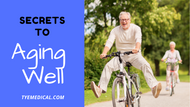10 Tips for Aging Well from the Inside Out
Written by Tye Medical on Jul 5th 2021
Ideally, you’ve been taking good care of yourself throughout your life, but how do you really know if you’re aging well? And if you haven’t been as health-conscious as you’d like to be, how do you start adopting healthier habits?
You’ll be glad to know that it’s never too late to start improving your overall health and wellbeing. When it comes to healthy aging, you’ll need to consider your whole person—body and mind. We’ve provided a list of the most crucial (and doable) tips for aging gracefully.
Not ready to go all the way? Then try taking on just a few of these habits because even small steps can add up to big health benefits.
1. Stay Active for Physical and Mental Health

In today’s sedentary world, where we sit surrounded by screens, our need for physical activity can’t be overstated. Endless research shows that regular exercise improves mobility, balance, and mood while reducing anxiety and depression symptoms. And of course, it’s a huge factor in managing (and reducing your risk for) chronic diseases like heart disease, high blood pressure, diabetes, certain cancers, and even osteoporosis.
But don’t despair if you’re cringing at just the thought of an hour at the gym. What matters most is finding a type of exercise that you enjoy (or can tolerate) because this means you’re more likely to stick with it. If you hate walking or jogging, try weight training at the gym. If you hate gyms, try home bodyweight workouts or yoga using an app. And those who despise structured exercises can find a tennis or cycling partner.
Looking for more exercise ideas? Check out our articles:
- How Daily Walking Benefits Seniors (and Tips for Getting Started)
- Workout at Home: Best Apps for Any Age (and Fitness Level)
- Exercise for Seniors: Best Workouts for Older Adults
- Exercising with Stress Incontinence: How to Beat the Leaks!
The CDC recommends 150 minutes per week of moderate-intensity activity that gets your heart pumping. Remember that some exercise is better than none, so just a few minutes each day is a good start.
Consult with your doctor before starting any new exercise program.
2. Engage Socially to Boost Well-Being
Aging well is about far more than your bodily health. It’s also about your emotional and mental wellbeing, which can positively impact you physically. Social interactions keep your mind active and enhance your mood because humans are communal creatures. And yes, this is true even for introverts.
Your brain was designed for connection, communication, and emotional engagement. As you age, it’s important not to lose community and friendships. If you don’t have an active social life, consider reconnecting with older friends, reaching out to family members, or making new acquaintances.
Gyms, church groups, volunteer organizations, and even alumni groups are great ways to meet new companions.
3. Don’t Skimp on Sleep

Even if you’re over 65, most adults require seven to eight hours of sleep each night for optimum mental and physical health. As you age, you might need to make some adjustments to your sleep schedule. Often, seniors begin tiring earlier at night and naturally waking earlier. If you notice this change, it’s best not to resist.
A crucial part of sleep health is listening to your body and knowing when it requires rest. A predictable sleep schedule will increase your sleep quality, which energizes your body, promotes healing, prevents disease, and enhances mental acuity.
If you have chronic insomnia, talk with your doctor about treatment options.
4. Eat for Your Health
A diet of nutritious, natural foods is a critical ingredient for aging well. The right foods will help you manage weight, fuel your body, and prevent disease. With so many diet plans and scientific studies out there, you’re probably wondering where to start. An excellent place to begin is with one of these two (very similar) eating plans:
Both diets emphasize eating whole foods (rather than processed foods), whole grains, and various fruits and vegetables but exclude foods high in saturated fat and sugar. The difference is that the anti-inflammatory diet has been adjusted to include more inflammation-fighting foods, restricting meat, and dairy products more.
5. Limit Alcohol

You might think this is a no-brainer, but many people would be surprised to know how little alcohol it takes to impact health negatively. CDC guidelines advise adults to avoid alcohol consumption or limit drinks to two per day for men and one per day for women. Consuming more than these amounts every week is considered “heavy drinking” and is likely to promote disease.
Science has linked excessive alcohol use or heavy drinking to the following diseases and conditions:
- Liver dysfunction and disease
- Pancreatitis (inflammation of the pancreas)
- High blood pressure
- Psychological disorders
- Cancer of the liver, mouth, throat, larynx, esophagus, and pancreas
But why is it so bad for your health? Your liver metabolizes alcohol but can only handle small amounts at a time. When you drink more than is recommended, your liver can’t keep up, and the excess alcohol remains in your bloodstream, circulating through your organs (including your brain), damaging them over time.
6. Practice Good Dental Hygiene
You might be surprised to find this habit on the list, but it’s a vital factor in aging well. Did you know that good dental hygiene helps prevent diabetes, heart disease, and even cancer? Studies suggest that men with gum disease are 14% more likely to develop cancer. Researchers believe that bacteria and inflammation are what link periodontal disease with other bodily disorders.
To keep yourself healthy from head to toe, the American Dental Association recommends brushing twice daily, flossing each day, cleaning dentures regularly, and getting preventative dental care every six months. Preventing inflammation in your mouth is a critical defense against inflammation and disease in other parts of your body.
7. Care for Your Skin

What’s your body’s largest organ?
Skin.
It’s the only barrier between your delicate internal organs and the outside elements. It takes a beating each day and requires regular TLC. Sure, we all want to look good, but skincare is also about maintaining good health.
Skin symptoms are often early indicators of other health problems like allergies, thyroid problems, diabetes, autoimmune disorders like Lupus, and cancer. As you wash and dress, pay attention to your skin and discuss any changes or issues with your doctor.
For healthier skin, follow these essential skincare tips:
- Wear sunscreen and protective clothing
- Use gentle skincare products (Cetaphil, CereVe)
- Moisturize daily
- Get annual skin cancer screenings
- Stay hydrated (your skin is made of 64% water)
8. Reduce Stress
Just because you’re a “senior adult” doesn’t mean you’re less prone to stress. While the triggers likely changed over the years, you still have life circumstances, finances, health, relationships, and family to manage.
Perhaps one of the most critical requirements for aging well is learning to manage stress. Stress increases chronic inflammation that leads to many types of illnesses. It prompts premature aging, wrinkles, heart disease and can even trigger autoimmune disorders.
Key ways to manage stress include:
- Exercise
- Restful sleep
- Yoga
- Meditation/prayer
- Companionship (talking about it)
For more stress reduction techniques, read our article, Stress Management for Seniors: Tips for Improving Health and Wellbeing.
9. Stimulate Your Brain

If you’re like most seniors, you want to stay mentally sharp and preserve your memory for as long as possible. With so much in the news about Alzheimer’s and other dementias, you’re wise to take proactive steps concerning mental health.
Healthy aging for your brain means processing new information, learning new hobbies and skills, and challenging your memory. Specific brain regions naturally shrink with age, but you can reverse this process if you continue to use and engage these areas.
Here are a few ways to boost memory and slow cognitive decline:
- Learn to play an instrument
- Learn a new language
- Take up a sport
- Read more
- Play brain games
For additional information and tips, read our article, Are You Losing It? How to Boost Memory Power and Prevent Dementia.
10. Pamper Your Bladder
You probably don’t consider hourly trips to the bathroom or urine leaks as aging well. But with the proper bladder care and quality incontinence products, you can have a healthier bladder and increased confidence as you engage in an active lifestyle.
When you adopt the proper habits, you can maintain a healthy bladder as you age. Even if you currently have incontinence symptoms, some simple changes could ease your discomfort. Try some of these pro tips to prevent or decrease bladder symptoms:
- Don’t hold your pee (go when you need to go)
- Resolve constipation
- Drink plenty of water (dehydration can aggravate bladder problems)
- Do Kegel exercises
- Avoid bladder-irritating foods
For more details, check out our article, 8 Ways to Keep Your Bladder Healthy for the New Year.
Stay Active with Premium Incontinence Products from TYE Medical
Aging well means embracing an exercise routine and increasing your social engagements, but it’s discouraging if bladder leaks hold you back.
Our online store offers a line of incontinence products that will increase your confidence and provide cost-effective solutions whether you need light incontinence supplies or moderate to heavy protection.
All our customers enjoy discreet shipping that’s free for orders over $20.
Need supplies in a hurry? If you order before 2 p.m., we offer same-day shipping at no extra charge.


